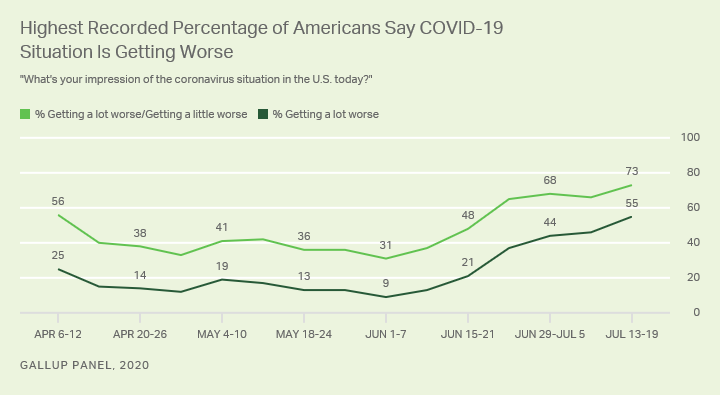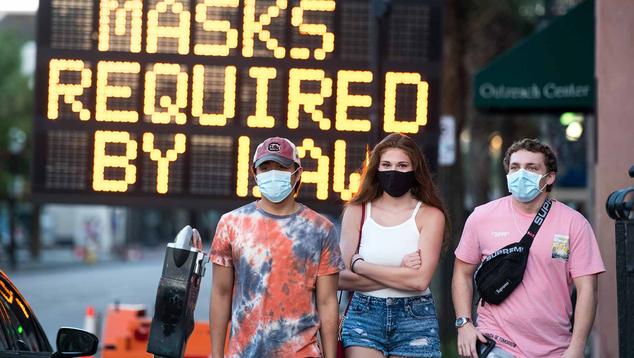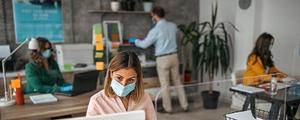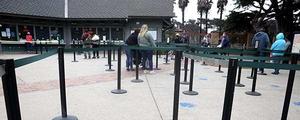Story Highlights
- 73% of Americans believe U.S. COVID-19 situation is getting worse
- 83% believe disruptions to work, education, travel will last through 2020
- 86% of Democrats, 15% of Republicans say situation "getting a lot worse"
WASHINGTON, D.C. -- As COVID-19 infections continue to rise sharply in the U.S., so too has Americans' pessimism about the trajectory of the coronavirus situation. Americans' view that the situation is getting worse has more than doubled to 73%, the highest Gallup has recorded since it began tracking these views in early April. This rise in pessimism comes six weeks after hitting a low of 31%.

Line graph. Percentage of Americans who believe the coronavirus situation is getting worse. In Gallup's July 13-19 survey, 73% of Americans said the coronavirus situation is getting worse and 55% believe it is getting a lot worse. Both are the highest recorded measures since trending began in April.
Notably, a majority of Americans (55%) now say the situation is getting "a lot worse," an increase of 46 percentage points since June 7. This coincides with the precipitous rise in coronavirus cases in recent weeks. On June 7, the seven-day average of new cases was less than 22,000 per day; by July 19, it had exceeded 66,000 cases per day.
As fewer respondents say they are confident that the country is successfully controlling the coronavirus, personal worry about becoming ill has also increased. The 58% of Americans who now say they are worried about being infected is the highest Gallup has recorded, by one point over the previous high from early April. It represents a 12-point increase since June 7 -- when the lowest percentage of Americans, 46%, expressed worry.

Line graph. Americans worries about contracting the coronavirus. Since early June, the percentage of Americans worried about being infected has risen 12 points to 58% as of July 19. This just surpasses the previous high of 57% on April 12.
Optimism and Level of Worry Vary Greatly by Party Identification
As with many questions surrounding the coronavirus, the largest gaps exist across partisan groups. Seventy-one points separate the 86% of Democrats who say the coronavirus situation in the United States is "getting a lot worse" and the 15% of Republicans who say the same. Meanwhile, just under half (48%) of independents believe the situation is "getting a lot worse."

Line graph. Americans' assessments of the coronavirus situation, by political party identification. 86% of Democrats say the situation is getting a lot worse, compared with 15% of Republicans. 48% of independents say the same. Each measure is the highest that has been recorded.
Partisans have not always been this divided: on June 7, 14% of Democrats believed the situation was "getting a lot worse," compared with 2% of Republicans and 10% of independents. Since then, this percentage has increased 72 points among Democrats, 13 points among Republicans, and 38 points among independents.
While the party groups are also divided when asked whether they are concerned about contracting the virus, one notable difference is the direction in which each party is trending: concern among Democrats (now 82%) and independents (58%) has increased by at least 14 points since June 7, but Republicans' worry (22%) has shown greater variation over that period. While Republicans' current level of concern is three points higher than it was on June 7 (19%), it also climbed as high as 30% during late June.

Line graph. Americans' worry about contracting the coronavirus, by political party. Democrats and independents have become at least 14 percentage points more worried about infection since June 7, compared with a three-point increase among Republicans. 82% of Democrats now worry about being infected, compared with 22% of Republicans and 58% of independents.
Expectations About Length of Disruption Shifts
As more Americans feel that the country is losing ground in its efforts to combat infections, they have also begun to shift their expectations about how long the pandemic will disrupt education, travel and work. In early April, 23% of respondents believed that these disruptions would persist through at least the end of 2020. This sentiment surpassed the majority level in mid-May, and is now 83%.

Line graph. Americans' opinions of how long disruptions related to the coronavirus will continue. 83% of Americans now believe the virus will cause disruptions through at least the end of 2020. On June 7, 18% of Americans believed the disruptions would last for a few more weeks. That has dropped to 3% as of July 19.
While it may be expected that more respondents would select "the rest of this year" or "longer than this year" in the second half of 2020, one indication that respondents are thinking about more than the calendar is in the percentage who believe disruptions will continue for "a few more weeks." While this figure previously held at or above 15% every week through June 14, this number has dropped precipitously to 3% since then. With more than "a few weeks" left in 2020, the data suggest that more Americans are preparing for an extended period of disruption than ever before.
Learn more about how the Gallup Panel works.




